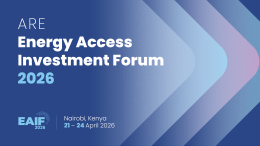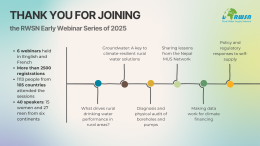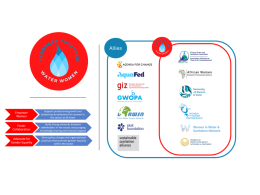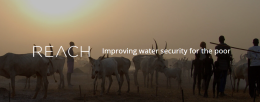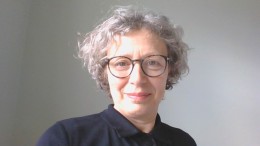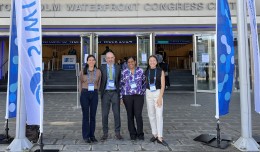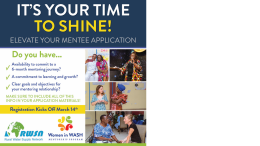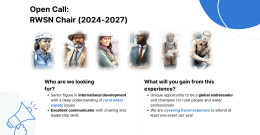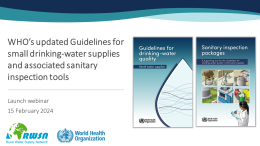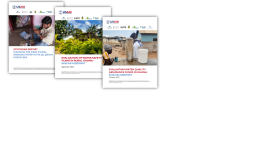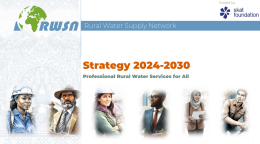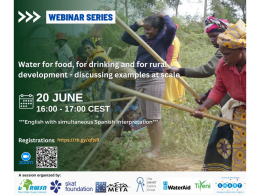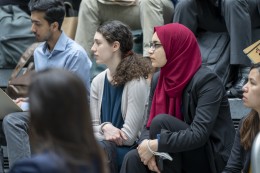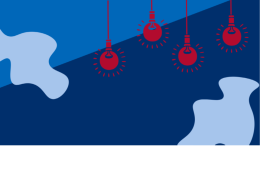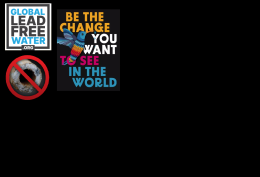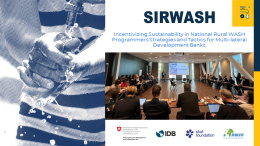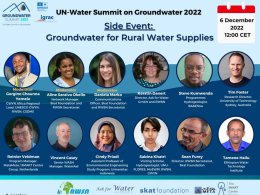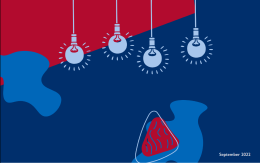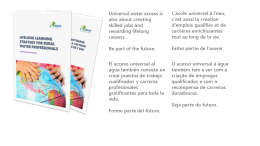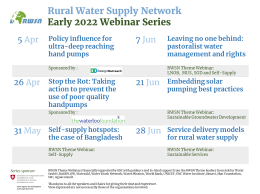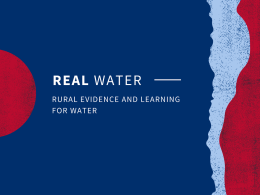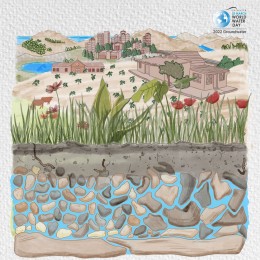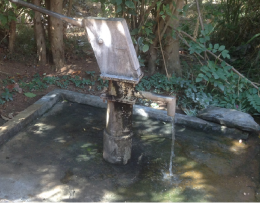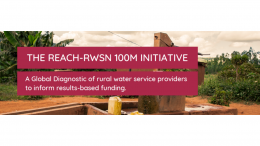Highlights of RWSN's projects, partnerships and knowledge products
Collaborations
Open Call: Represent Water at the Energy Access Investment Forum (EAIF) 2026
Rural Water Supply Network (RWSN) partnered with the Alliance for Rural Electrification (ARE)
Project start: 2026 • Project finished: 2026
Collaborators: Alliance for Rural Electrification
Funder:
Summary
The Rural Water Supply Network (RWSN) and the Alliance for Rural Electrification (ARE) have partnered to bring water to the attention of the rural electrification community.The ARE organises the Energy Access Investment Forum (EAIF), the leading annual global event focused on investment in decentralised renewable energy (DRE). EAIF brings together companies, investors, DFIs, governments, and development partners, with previous editions attracting over 1,000 participants.
EAIF 2026 will take place 21–24 April 2026 in Nairobi, supported by GET.invest and European donors.
RWSN Early Webinar Series 2025
Join us for six webinars running between April and June
Project start: 2025 • Project finished: 2025
Collaborators:
Funder:
Summary
We are excited to announce the first RWSN webinar series of 2025, running from April to June! Each session will feature real-world experiences, lessons learned, and opportunities to engage with peers from around the world. Whether you are a practitioner, policymaker, researcher, or student, there is something for everyone.***French interpretation is provided for each webinar.***
Stronger Together! Coalition
Water Women
Project start: • Project finished:
Collaborators:
Funder:
Summary
Water and WomenAchieving Sustainable Development Goal (SDG) 6 for Clean Water and Sanitation, as well as SDG 5 on Gender Equality needs a holistic and systematic approach. This includes understanding the workforce behind the water resources and WASH systems sector, as skill shortages continue to affect the lack of progress on these SDGs. Data reveals that women only make up 21% of jobs in water utilities (1) and are under-represented in terms of participation at all levels in the sector (2). Visible and invisible barriers continue to hinder women to engage, develop, and fulfill their careers. This means that not all potential contributors are engaged, which leads to negative impacts, such as missing out on diverse thinking, creative solutions, and the improvement of overall sector performance. Therefore, it is necessary to advocate and work towards a strong, gender-equitable sector for water resources and WASH systems.
(1) World Bank Water Data
(2) Taking Stock of Progress Towards Gender Equality in the Water Domain (2021)
Celebrating the REACH Programme
A Decade of Transforming Water Security
Project start: 2015 • Project finished: 2025
Collaborators:
Funder:
Summary
As the REACH programme concludes, we reflect on a decade of dedicated research and impactful interventions aimed at enhancing water security for vulnerable communities worldwide. Funded by the UK's Foreign, Commonwealth & Development Office (FCDO), REACH has significantly contributed to the global water security agenda.Anna Nileshwar from the FCDO noted, "The FCDO-funded REACH programme has exceeded our expectations in so many ways, improving water security for over 10 million people worldwide. The wealth of in-depth and interdisciplinary research developed over 10 years has hugely expanded the evidence base and will guide the UK’s approach to development for better water security worldwide."
By celebrating the culmination of the REACH programme, we acknowledge the collective efforts of all partners, researchers, and communities involved. The insights and lessons learned will continue to inform and guide future efforts in achieving sustainable water security for all.
Please visit the REACH website to continue building on the programme’s impact:
Celebrating the life of Louisa Gosling
Project start: • Project finished:
Collaborators:
Funder:
Summary
It is with deep sadness that we inform our members and partners of the passing of Louisa Gosling, former Chair of the RWSN Executive Committee (2019-2022), former Theme Leader of the Leave No One Behind theme (2011- 2021), and a great champion of Human Rights to water and sanitation.Louisa was an inspiration for many, including the younger generation of WASH professionals at the early stages of their career. For those who were fortunate enough to have had the opportunity to work with her in person, Louisa always taught them something new each time, and was never afraid to challenge - always politely - in a way that got people thinking more deeply, more widely and profoundly... Louisa was exceptionally engaged with and a constant source of support for professionals as the field of equity and inclusion evolved and new topics emerged. Her open-minded nature was one of the critical catalysts of the fast-paced progression of efforts to leave no one behind in the WASH sector globally, which clearly shone through her work for RWSN, whether it be through leading webinars, or her passionate involvement in RWSN online discussions. Louisa had a constant presence in the working lives of inclusion experts. She actively made efforts to ensure that the younger generation of professionals had a voice, striving to constantly give them a platform, whether it be through actively involving them as part of conference workshops to encouraging them to write about their work far and wide on platforms ranging from the SuSaNA forum through to WaterAid’s WASH Matters blog.
Her first-hand experience on the ground working with marginalised groups over the years shaped her leadership of the RWSN Leave no one behind theme, leaving an unparalleled legacy for theme leaders who would follow in her footsteps in years to follow.
You can follow Louisa’s funeral and memorial, and share your condolences with her family using the link below.
RWSN at the World Water Week, 25-29 August 2024
Our activities during the World Water Week in Stockholm
Project start: 2024 • Project finished: 2024
Collaborators:
Funder:
Summary
World Water Week presented a great opportunity to gather the RWSN Secretariat together and join our friends and partners in numerous sessions and events. You can find recordings of sessions on the WWWeek Digital Platform: https://event.trippus.net/Home/Index/AEAKgINwoafUOTY0oW53dgzJNGXw8gNEd8UeZ8jQ_rxTt9LQIqFfJLPhC1jNXurmHv6UpVWCE5N5/AEAKgIMgfLVpyqEio5bKw5tn4lZGBhnyOHByeFn-cWE-dXwGWp8fJzGZA-f84F-tWrfx9ApVi10L/engEnhancing Rural Water through People-Centred Data and Inclusive Cooperation (Official Online Session, ID 11793):
The session delves into rural Multiple Use water Services (MUS), evaluating the role of people-centred data in shaping water safety plans and safeguarding water sources. The session emphasizes community management with indigenous perspectives, underlining the significance of inclusive cooperation in enhancing rural water management and resilience.
Coordinating Rural Water Investments to Promote Security and Stability (Official Onsite and Online Session, ID 11653):
Water development is vital for social and economic advancement. It also alleviates conflicts that contribute to social instability. Progress requires oversight, coordination, and monitoring. However, limited collaboration among development partners can result in inefficiencies. By blending case studies with interactive dialogue, this session will explore strategies for effective donor coordination.
Stronger Together! Water Women Evening Mingle and Networking (Offsite in-person and online event):
Join us for a women-only meet and mingle event. Enjoy food and drinks while connecting with incredible women from around the world who share your passion for tackling water and sanitation challenges. This is a great chance to expand your network of fellow water women.
Stop the Flow of Lead in New Drinking Water Systems (Official Online Session, ID 11895):
This workshop will discuss sources of lead contamination in drinking water and discuss steps governments, development partners, and the private sector can take to reduce lead exposure from drinking water in low- and middle-income countries – including the strengthening of regulations and enforcement of standards for lead-free drinking water components.
RWSN Early Webinar Series 2024
April - June 2024
Project start: • Project finished:
Collaborators:
Funder:
Summary
The series featured two webinars of the Stop the Rot initiative, and webinars from the Leave No-one Behind, Data for Action, and Self-Supply themes.Stop the Rot: Experiences and challenges of preventing rapid corrosion of rural water supply infrastructure
30 April, 14:00 CEST
Rapid handpump corrosion and the underlying causes have been known for decades, and yet still occur. This webinar presented a World Bank technical note that calls for the prevention of rapid corrosion through regulation alongside experiences from Uganda and Zambia.
Incontinence: An urgent hidden issue for rural water supply
4 June, 09:00 CEST
This webinar by the RWSN Leave No-one Behind theme raised awareness of the need to pay attention to the needs of people living with incontinence across all ages. This webinar enabled RWSN members and attendees to understand the issue of incontinence and why it matters for rural water supply.
Artificial Intelligence and Water Management: Opportunities, Effectiveness, Limitations and Ethics
11 June, 14:00 CEST
This webinar by the RWSN Data for Action theme introduced network members to the opportunities that AI can bring to water management challenges of the 21st century by sharing practical examples of AI applications in rural water supply. However, the webinar also highlighted any limitations and ethical issues members need to be aware of before using AI by sharing real-world examples of AI’s limitations and/or ethical grey areas.
Supported self-supply: case studies from four continents
18 June, 09:00 CEST
Self-supply exists in almost all countries around the world and in specific times and areas can be the dominant form of service provision. Nevertheless, information on this approach typically is scattered and hard to find – mostly due to the passive role of government and the lack of reporting/monitoring mechanisms. This webinar by the RWSN Self-Supply theme explored the case studies of formal programs to support self-supply from four continents.
Stop the Rot: The quality challenge - ensuring a high standard of rural water infrastructure from the outset
25 June, 14:00 CEST
Poor quality infrastructure continues to be a problem in rural water supplies. This webinar provides a platform to discuss the issue, including looking at some of the types of quality problems encountered and experiences of several organizations who have managed to consistently procure quality components.
Mentoring programme / Programme de mentorat / Programa de tutoría
Mentor and mentee registration is now open! L'inscription des mentors et des mentorés est maintenant ouverte ! Ya está abierto el plazo de inscripción para mentores y alumnos.
Project start: 2024 • Project finished: 2024
Collaborators: WASH Agenda for Change, Women in WASH Mentoring Program
Funder: Global Water Center, CARE
Summary
Join the 2024 RWSN Mentoring programme in collaboration with Agenda for Change and Global Water Center - and seize the opportunity to learn from experienced professionals in the water, sanitation, and hygiene (WASH) sectors.Why Should You Apply? We have an exceptional lineup of mentors eager to guide you on your journey. This is your chance to tell us why you're excited about the water sector and what you're passionate about achieving. Remember, competition is fierce, so the more you share about yourself, your goals, and your enthusiasm for the program, the better your chances of success! What Do You Want to Work On? Whether it is advancing your career, sharpening your skills, or making a difference in your community, our mentoring program is tailored to your needs. Share your aspirations with us, and let's work together to make them a reality. The programme is available in English, Spanish, and French.
///
Rejoignez le programme de mentorat 2024 RWSN en collaboration avec Agenda for Change et Global Water Center - et saisissez l'opportunité d'apprendre de professionnels expérimentés dans les secteurs de l'eau, de l'assainissement et de l'hygiène (WASH).
Pourquoi postuler ? Nous disposons d'un groupe exceptionnel de mentors désireux de vous guider dans votre parcours. C'est l'occasion de nous dire pourquoi le secteur de l'eau vous passionne et ce que vous souhaitez réaliser. N'oubliez pas que la concurrence est féroce. Plus vous en direz sur vous, sur vos objectifs et sur votre enthousiasme pour le programme, plus vous aurez de chances de réussir ! Sur quoi voulez-vous travailler ? Qu'il s'agisse de faire progresser votre carrière, d'affiner vos compétences ou de faire une différence dans votre communauté, notre programme de mentorat est adapté à vos besoins. Faites-nous part de vos aspirations et travaillons ensemble pour les concrétiser. Le programme est disponible en anglais, en espagnol et en français.
///
Únase al programa 2024 RWSN Mentoring, en colaboración con Agenda for Change y Global Water Center, y aproveche la oportunidad de aprender de profesionales experimentados en los sectores del agua, el saneamiento y la higiene (WASH).
¿Por qué deberías solicitarlo? Tenemos un grupo excepcional de mentores deseosos de guiarte en tu viaje. Esta es tu oportunidad para contarnos por qué te entusiasma el sector del agua y qué te apasiona conseguir. Recuerda que la competencia es feroz, así que cuanto más compartas sobre ti, tus objetivos y tu entusiasmo por el programa, mayores serán tus posibilidades de éxito. ¿En qué quiere trabajar? Tanto si se trata de avanzar en su carrera profesional, perfeccionar sus habilidades o marcar la diferencia en su comunidad, nuestro programa de mentores se adapta a sus necesidades. Comparte con nosotros tus aspiraciones y trabajemos juntos para hacerlas realidad. El programa está disponible en inglés, español y francés.
Open Call: RWSN Chair (2024-2027)
Opportunité : Président du RWSN (2024-2027)
Project start: 2024 • Project finished: 2027
Collaborators:
Funder:
Summary
• Do you have a vision of a world in which all people enjoy safely managed water services that are resilient and sustainable?• Do you see a way to improve the quality of rural water services and their management?
We are seeking an exceptional individual to become the new Chair of the network for the next three years (2024-2027). The role and criteria are outlined in the call. The position carries no remuneration, but expenses are covered where applicable, but it is unique opportunity to be a global ambassador and champion for rural people and water professionals.
You can nominate yourself or someone else.
Apply before 30 June 2024!
WHO’s updated Guidelines for small drinking-water supplies and associated sanitary inspection tools
Launch: 15 February
Project start: 2024 • Project finished:
Collaborators: WHO, RWSN
Funder: WHO
Summary
#Webinar alert! World Health Organization and RWSN - Rural Water Supply Network will hold a global webinar on 15 February to launch WHO's updated Guidelines for drinking-water quality: small water supplies, and the associated Sanitary inspection packages – a supporting tool for the Guidelines for drinking water quality: small water supplies.These publications build on over 60 years of guidance by WHO on drinking-water quality and safety, and together update and supersede WHO’s 1997 guidance addressing the surveillance and control of community supplies. The new publications provide practical guidance for progressive improvements towards safe and sustainable drinking-water services for people served by the full diversity of small water supplies.
In this session, participants will gain awareness of key features of the Guidelines and tools, exchange with experts and practitioners on implementing the recommendations and guidance, and gain insights into upcoming efforts to further support implementation of the guidance.
New REAL-Water Publications for January 2024
Project start: 2021 • Project finished: 2025
Collaborators: Aquaya Institute, Aguaconsult, KNUST, Safe Water Network, RWSN, Water Mission, UTS-ISF
Funder: USAID
Summary
REAL-Water is now in its third year and fieldwork is well underway. In the meantime there is a pipeline of new publications from the early work:
RWSN Strategy/Stratégie 2024-2030
Project start: 2024 • Project finished: 2030
Collaborators:
Funder:
Summary
The Rural Water Supply Network (RWSN) is the only global network dedicated to supporting rural water professionals as they strive to ensure universal access to safe, affordable water for drinking and livelihoods. This Strategy sets out the Vision, Mission and Aims of the network up to 2030. We summarise the main trends, challenges and opportunities, and how we as a network can make a strategically significant contribution to the Sustainable Development Goals and Human Right to Water. Based on our three pillars of strength, this strategy sets out our Theory of Change, structure, perspectives and thematic priorities and around which members can use our network to collaborate, share, learn and improve. This document is also an invitation to be part of a global movement to achieve and sustain universal access to safe drinking water, and to contribute to broader goals of rural development and poverty eradication.Le réseau rural d'approvisionnement en eau (RWSN) est le seul réseau mondial dédié au soutien des professionnels de l'eau en milieu rural qui s'efforcent d'assurer un accès universel à une eau saine et abordable pour la consommation et les moyens de subsistance. Cette stratégie définit la vision, la mission et les objectifs du réseau à l'horizon 2030. Nous résumons les principales tendances, les défis et les opportunités, et la manière dont nous pouvons, en tant que réseau, apporter une contribution stratégique significative aux objectifs de développement durable et au droit de l'homme à l'eau. Fondée sur nos trois piliers, cette stratégie définit notre théorie du changement, notre structure, nos perspectives et nos priorités thématiques, autour desquelles les membres peuvent utiliser notre réseau pour collaborer, partager, apprendre et s'améliorer. Ce document est également une invitation à faire partie d'un mouvement mondial visant à atteindre et à maintenir l'accès universel à l'eau potable, et à contribuer aux objectifs plus larges du développement rural et de l'éradication de la pauvreté.
RWSN Webinar early series, May- Jun 2023
RWSN Webinar early series, May- Jun 2023
Project start: 2023 • Project finished: 2023
Collaborators:
Funder: Skat Foundation (Sufosec Alliance), the Waterloo Foundation
Summary
Source of presentations and recordings of the Early 2023 RWSN Webinar seriesThis year we will host our first webinar series of 4 webinar between 30 May and 27 June. Please see the titles and dates of the webinars below
• 30 May – Opportunities and Challenges of Government-led SDG 6.1 monitoring in Fragile and Conflict-Affected States (Leave no one behind and Data for Action Themes)
• 6 June – Stop the rot - Handpump Upgrade…to Be, or Not to Be? (Design Outreach/Waterloo Foundation/Sustainable Groundwater Development Theme)
• 20 June – Water for food, for drinking, and for rural development - examples at scale (Self Supply Theme)
• 27 June – Customary water tenure 1 (MUS Theme and IYRP group)
Links for registration below
**********************
Source des présentations et des enregistrements de la série de webinaires RWSN Early 2023.
Cette année, nous organiserons notre première série de 4 webinaires entre le 30 mai et le 27 juin. Veuillez consulter les titres et les dates des webinaires ci-dessous
- 30 mai - Opportunités et défis du suivi de l'ODD 6.1 mené par le gouvernement dans les États fragiles et touchés par un conflit (ne laisser personne de côté et thèmes des données pour l'action)
- 6 juin - Halte aux dégradation - Amélioration des pompes à main... à faire ou à ne pas faire ? (Design Outreach/Waterloo Foundation/Thème du développement durable des eaux souterraines)
- 20 juin - L'eau pour l'alimentation, la boisson et le développement rural - exemples à l'échelle (thème de l'auto-approvisionnement)
- 27 juin - Tenure coutumière de l'eau 1 (Thème MUS et groupe IYRP)
Liens pour s'inscrire ci-dessous
Call to water services providers to support young professionals' careers
Project start: 2023 • Project finished: 2023
Collaborators: Aquafed
Funder: Netherlands government through the Valuing Water Initiative
Financial Innovations
for Rural Water Supply in Low-Resource Settings
Project start: • Project finished:
Collaborators: REAL-Water consortium members: The Aquaya Institute, Aguaconsult, the Kwame Nkrumah University of Science and Technology (KNUST), the Skat Foundation’s Rural Water Supply Network (RWSN), Safe Water Network, and Water Mission.
Funder: USAID
Summary
Millions of people in rural areas of low- and middle-income countries still lack access to basic water services. In fact, as of 2020, the majority of people without basic water services lived in rural areas. The United States Agency for International Development (USAID) Rural Evidence and Learning for Water (REAL-Water) program is working to address this issue by identifying ways to expand water access and safety in rural areas.One of the challenges of providing rural water supply financing is that the populations are smaller, more dispersed, and poorer than their urban counterparts. This may reduce opportunities for economies of scale and complete cost recovery. To overcome these challenges, the REAL-Water program is focusing on identifying innovative and promising financing or funding mechanisms that can be used in small villages and dispersed settlements.
A Global Pledge to Protect Drinking Water from Lead
World Water Day / UN Water Conference 2023
Project start: 2022 • Project finished: 2040
Collaborators: Governments of South Africa, Uganda and Ghana, WHO, UNICEF, Conrad N. Hilton Foundation, LIXIL, RTI international, World Plumbing Council, University of North Carolina, World Vision, IAPMO, RWSN, University of Leeds, WaterAid,
Funder:
Summary
Nothing is more fundamental to human health and well-being than access to safe drinking water. In 2016, world leaders adopted the Sustainable Development Goals (SDGs) including SDG 6 — a universal call to action to provide access to safe and affordable drinking water to every person, everywhere, by 2030. As part of our global commitment to provide water that is free from microbial hazards and priority chemical contaminants that impact human health, we launch this global initiative to work towards lead-free drinking water by 2040.
SIRWASH: Sustainable and Innovative Rural Water, Sanitation and Hygiene
Servicios sostenibles e innovadores de Agua, Saneamiento e Higiene en zonas rurales – SIRWASH
Project start: 2020 • Project finished: 2024
Collaborators: IDB, SuSanA
Funder: SDC
Summary
The general objective of the SIRWASH programme is to improve enabling policy, innovation and knowledge exchange environments and to foster the necessary capacities to deliver quality WASH services to rural communities with a particular focus on vulnerable and disadvantaged people.In 2023, RWSN is collaborating with the Inter American Development Bank (IDB) and the Sustainable Sanitation Alliance (SuSanA) to share good practices an experiences within Latin America and the Caribbean (LAC) and encourage South-South exchange on rural WASH with practitioners in Africa and Asia.
Join us for the #SIRWASH Webinar 1: Regional and National Monitoring of Rural WASH
Mark your calendars for October 4, 2023, at 16:00 (CEST) / 10:00 (EST) / 14:00 (GMT)
This is the first event of the webinar series of the SIRWASH Programme (Sustainable and Innovative Rural Water, Sanitation and Hygiene)
The event will be multilingual, with simultaneous translation into EN, FR, PT, and SP.
We will be joined by an esteemed lineup of partners and organizations:
-Inter-American Development Bank with the support of Swiss Agency for Development and Cooperation
-Asian Development Bank (ADB)
-African Development Bank Group
-Water For People
-RWSN - Rural Water Supply Network / Skat Foundation
UN Groundwater Summit 2022
7-8 December 2022 | Pre-Summit events: 6 December 2022 UNESCO HQ in Paris, France
Project start: 2022 • Project finished: 2022
Collaborators: UN-Water
Funder:
Summary
The UN-Water Summit on Groundwater will be the culminating event of the 2022 campaign “Groundwater: making the invisible visible”, implemented by the dedicated UN-Water Task Force, co-coordinated by UNESCO and the International Groundwater Resources Assessment Centre (IGRAC), on behalf of UN-Water. The main messages from the Summit will be conveyed to the United Nations 2023 Water Conference.
Technological Innovations for Rural Water Supply in Low-resource Settings
CHALLENGES OF RURAL WATER SUPPLY
Project start: • Project finished:
Collaborators: Aquaya Institute, Aguaconsult, ATREE, KNUST, RWSN, Skat Foundation, Safe Water Network, Water Mission
Funder: USAID
Summary
Globally, the Sustainable Development Goals (2015–2030) are driving efforts to increase water service levels, while ensuring that services are affordable and no vulnerable population is left behind. In concert with global development goals, the United States Agency for International Development (USAID) Rural Evidence and Learning for Water (REAL-Water; 2021–2026) program focuses on identifying ways to expand water access and safety in rural areas of low- and middle-income countries. Rural areas pose special challenges for water supply, as homes may be too few or too dispersed to justify the cost of installing underground pipes from a high-quality water supply source or a centralized drinking water treatment facility. As of 2020, the majority of people lacking even basic water services (i.e., water from a protected source requiring no more than 30 minutes to collect) lived in rural areas.
Lifelong Learning Strategy / Stratégie d'apprentissage tout au long de la vie
Estrategia de formación continua / Estratégia de aprendizagem ao longo da vida
Project start: 2022 • Project finished: 2030
Collaborators: RWSN
Funder: Open to new partnerships
Summary
RWSN is a global network of rural water supply professionals and organisations committed to improving their knowledge, competence and professionalism, to fulfil RWSN’s vision of sustainable rural water services for all. Both individuals and organisations participate in the network.This strategy presents ways in which the network can continue to create and grow value in the coming 5-10 years:
1. Connect those seeking specialist training and mentoring with those who can provide that support.
2. Build partnerships to identify and fill thematic gaps in capacity development of rural water supply professionals and organisations, at global and regional levels.
3. Act as a broker to support scaling-up of ideas and organisations through training, mentoring, coaching and match-making between potential partners.
4. Providing value for money and easy-to-use, transparent procurement options so that RWSN achieves full cost recovery for providing these services.
We are inviting feedback on our draft Lifelong Learning Strategy
///
Le RWSN est un réseau mondial de professionnels et d'organisations du secteur de l'approvisionnement en eau en milieu rural qui s'engagent à améliorer leurs connaissances, leurs compétences et leur professionnalisme, afin de concrétiser la vision du RWSN de services d'eau durables pour tous en milieu rural. Tant les individus que les organisations participent au réseau.
Cette stratégie présente les moyens par lesquels le réseau peut continuer à créer et à accroître sa valeur dans les 5 à 10 prochaines années :
1. Connecter ceux qui recherchent une formation spécialisée et un mentorat avec ceux qui peuvent fournir ce soutien.
2. Construire des partenariats pour identifier et combler les lacunes thématiques dans le développement des capacités des professionnels et des organisations de l'approvisionnement en eau en milieu rural, aux niveaux mondial et régional.
3. Agir en tant que courtier pour soutenir la mise à l'échelle des idées et des organisations par le biais de la formation, du mentorat, du coaching et de la mise en relation entre partenaires potentiels.
4. Fournir un bon rapport qualité-prix et des options d'approvisionnement faciles à utiliser et transparentes, afin que le RWSN parvienne à un recouvrement total des coûts pour la fourniture de ces services.
Nous vous invitons à nous faire part de vos commentaires sur notre projet de stratégie d'apprentissage tout au long de la vie
RWSN Early Webinar Series 2022
Série de webinaires RWSN 2022
Project start: 2022 • Project finished: 2022
Collaborators:
Funder: SDC, Skat Foundation, Design Outreach, Waterloo Foundation and contributions from Theme Leaders and presenters
Summary
Greetings /Bonjour (message en français plus bas ),Mark your calendars! RWSN is delighted to announce its 2022 early series of 6 webinars (on-line seminars), running from April 5th until June 28th, in Englis and/or French
5 Apr - Policy influence for ultra-deep reaching hand pumps (Sponsored by Design Outreach)
26 Apr - Stop the Rot: Taking action to prevent the use of poor quality handpumps (Sponsored by Waterloo Foundation)
31 May - Self-supply hotspots: the case of Bangladesh
7 Jun - Pastoralist water management and rights
21 Jun - Embedding solar pumping best practices
28 Jun - Service delivery models for rural water supply
Series Sponsor: Swiss Agency for Development and Cooperation (SDC)
REAL-Water
Rural Evidence and Learning for Water / Attestation et Apprentissage Ruraux pour L'Eau
Project start: 2021 • Project finished: 2026
Collaborators: Aguaconsult, WELL Labs, KNUST, Safe Water for Network, Water Mission, RWSN
Funder: REAL-Water is supported through a $18.9 million Cooperative Agreement between USAID and The Aquaya Institute (Aquaya)
Summary
REAL-Water will support policy makers, development partners, and service providers to make strategic decisions and implement best practices for water management through implementation research. It will also ensure coordination with USAID programs contributing to the Water, Sanitation, and Hygiene (WASH) and Water Resources Management (WRM) knowledge base, in alignment with the USAID Water for the World Implementation Research Agenda.REAL-Water is an initiative of the Center for Water Security, Sanitation and Hygiene in USAID’s Bureau for Resilience and Food Security with support from the Office for Maternal and Child Health and Nutrition in USAID’s Bureau for Global Health.
////
REAL-Water aidera les décideurs politiques, les partenaires de développement et les prestataires deservices à prendre des décisions stratégiques et à mettre en oeuvre les meilleures pratiques de gestion del'eau grâce à la recherche sur la mise en oeuvre. La coordination sera également assurée avec lesprogrammes de l'USAID contribuant à la base de connaissances sur l'eau, l'assainissement et l'hygiène(WASH) et la gestion des ressources en eau (WRM), conformément au programme de recherche sur la miseen oeuvre de l'eau pour le monde de l'USAID.
REAL-Water est une initiative du Centre pour la sécurité de l'eau, l'assainissement et l'hygiène du Bureaupour la résilience et la sécurité alimentaire de l'USAID, avec le soutien du Bureau de la santé maternelle etinfantile et de la nutrition au sein du Bureau de la santé mondiale de l'USAID.
Groundwater: Making the Invisible Visible
World Water Day 2022
Project start: 2022 • Project finished: 2020
Collaborators: UN-Water
Funder:
Summary
Groundwater is invisible, but its impact is visible everywhere. Out of sight, under our feet, groundwater is a hidden treasure that enriches our lives. Almost all of the liquid freshwater in the world is groundwater. For rural areas it is often the safest, most reliable water resources.As climate change gets worse, groundwater will become more and more critical. We need to work together to sustainably manage this precious resource. Groundwater may be out of sight, but it must not be out of mind.
Stop the Rot!
A project in action research and catalysing action to ensure the quality of water lifting technologies for drinking water in sub–Saharan Africa.
Project start: 2021 • Project finished: 2022
Collaborators: Ask for Water GmbH, Skat Foundation
Funder: Waterloo Foundation
Summary
The Challenge1) Premature corrosion and failure of water supply hardware, such as handpumps, is widespread across Sub-Saharan Africa, but evidence is limited and largely anecdotal.
2) For tens of millions of Africans who depend on handpumps for their daily water needs, these failures threaten their health and livelihoods.
3) Despite millions of dollars wasted on poor quality hardware, there seems to be a lack of interest among key international donors and other development partners that fund rural water supply services to engage in the problem of variable handpump quality.
This new RWSN initiative by Skat Foundation and Ask for Water GmbH strives to find ways in which key stakeholders can ensure that handpump technologies and spare parts that are installed for drinking water in sub-Saharan Africa are consistently of high quality and can last
L'initiative REACH/RWSN pour 100 millions de personnes (100M)
Un diagnostic global des fournisseurs de services d'eau en milieu rural pour éclairer le financement basé sur les résultats
Project start: 2020 • Project finished: 2030
Collaborators: REACH; Uptime Consortium; University of Oxford; autres partenaires
Funder: Foreign, Commonwealth and Development Office (FCDO)
 Google Übersetzer
Google Übersetzer

